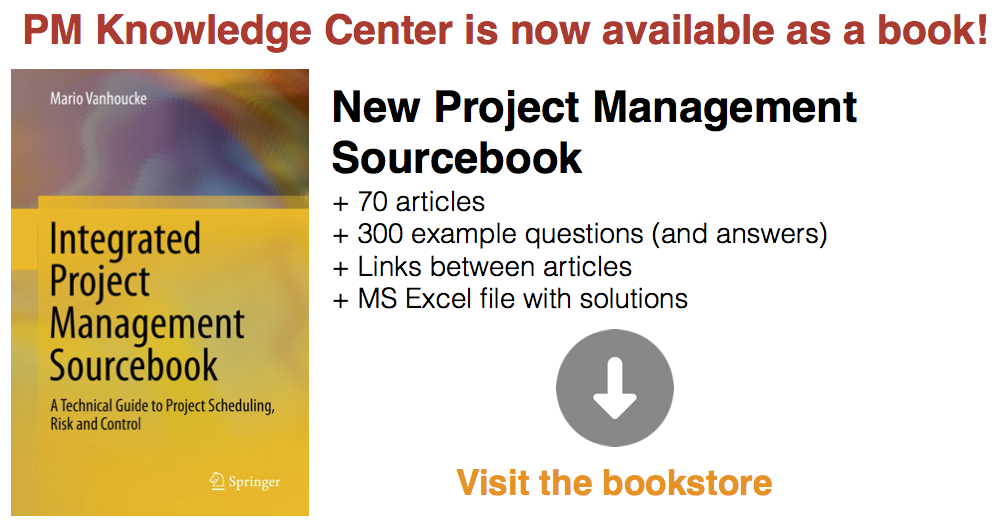Project Management
TMN, Issue 1, 2010: Measuring time: An earned value performane management study
Submitted by Mario Vanhoucke on Mon, 10/29/2012 - 15:00TMN, Issue 1, 2009: Forecasting a project’s duration under various topological structures
Submitted by Mario Vanhoucke on Mon, 10/29/2012 - 12:26TMN, Summer 2008: Earned value forecast accuracy and activity criticality
Submitted by Mario Vanhoucke on Fri, 10/26/2012 - 10:26TMN, Winter 2007: Measuring the accuracy of earned value/earned schedule forecasting predictors
Submitted by Mario Vanhoucke on Fri, 10/26/2012 - 09:44Welcome to the College of Performance Measurement: The world’s leading source of performance management information
Submitted by Mario Vanhoucke on Wed, 10/24/2012 - 10:20The College of Performance Management is an international, non-profit professional organization dedicated to the disciplines of project management and performance measurement. They assist the earned value professional and project manager in professional growth and promote the application of earned value management. They are a growing body of professionals dedicated to managing projects on time and on budget.
Welcome to EVM Europe: Where research meets practice
Submitted by Mario Vanhoucke on Tue, 10/16/2012 - 13:20EVM Europe initiative maintains momentum
Submitted by Mario Vanhoucke on Tue, 10/16/2012 - 12:34The EVM Europe initiative continues to progress with a successful third EVM Europe 2012 conference held at "the Escuala Técnica Superior de Ingenieria de Edificacion, part of the Universitat Politecnica de Valencia" (the School of Building Engineering at the Polytechnic University of Valencia, Spain) on 23-24 November 2011. Valencia is a hirstoric Spanish city located on the Mediterranean coast first fouded as a Roman colony in 138 BC. The hirstoric center is a large 169 acres in size and the city is also known for many monuments including the landmark City of Arts and Sciences, an avant-garde and futuristic museum complex.
EVM Europe initiative continues to develop
Submitted by Mario Vanhoucke on Tue, 10/16/2012 - 12:26The EVM Europe initiative progresses with a successful second EVA Europe Conference held at the historic “Het Pand”, the Cultural Centre of Ghent University on 24–25 November 2010 with about 90 delegates and speakers attending. Het Pand, a former Dominican monastery, is located in the historical centre of the city of Ghent, on the banks of the River Leie. The oldest parts of this impressive building date from the 13th Century. Using Het Pand came from a collaboration between Ghent University, which owns the facility, and the Vlerick Leuven Ghent Management School, which sponsored the conference.
EVA Europe initiative lifts off with a successful EVA-1 conference
Submitted by Mario Vanhoucke on Tue, 10/16/2012 - 12:21Message to students: Interested in Project Management? Get Involved!
Submitted by Mario Vanhoucke on Thu, 10/04/2012 - 18:25Project management isn’t just about projects. It’s about people, who are willing to share their ideas on the management of projects. Not only success stories and state-of-the-art case studies are relevant, but different often conflicting points of view, coming from professionals, academics and... yes, young students are inspiring. That is why it’s important to get involved with PM organizations. Join them, visit their events and share your ideas with them. It will increase your ability to exploit opportunities in the (near) future when you start your professional career.
© OR-AS. PM Knowledge Center is made by OR-AS bvba | Contact us at info@or-as.be | Visit us at www.or-as.be | Follow us at @ORASTalks


